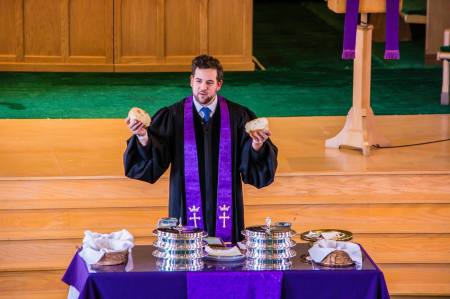W. Virginia pastor walks 175 miles to bring awareness to extreme poverty, homelessness

A West Virginia pastor recently completed a 175-mile walk over eight days to draw attention to extreme poverty and homelessness being faced by people across the state who are often ignored by society.
“As someone who strives to emulate Jesus, I believe it is my responsibility, and the responsibility of all people of faith, to advocate and care for people who are up against it the most,” the Rev. Zac Morton of First Presbyterian Church Morgantown wrote in a note on a website dedicated to his campaign for the poor and homeless.
“It is my hope that any conversation generated around #WALK4WV and the stories we are able to highlight will help reshape and refocus the way we approach the complexity of houselessness and extreme poverty. Instead of offering top-down solutions, we can partner with individuals and create networks of positive relationships that can lead to a better future for all West Virginians.”
Morton began walking from Morgantown on Sept. 21 and arrived at the State Capitol in Charleston on Monday where he completed his 175-mile journey with plenty of support along the way.
He told The Record Delta that about 30 people began the walk with him for the first two miles on the 21st and a day later he was joined by a group from The Foundry Church in Morgantown Tuesday. He also got support from a group from the Church of the Covenant in Grafton.
In a video posted to his Facebook page as he neared the end of the walk on Monday, Morton explained that his advocacy would not end with the walk.
“The walk doesn’t end once I get to the State Capitol,” he said. “I’m not gonna be walking the roads anymore but what we’re gonna do is we’ve made some contacts and built some relationships with different direct service agencies in the state, other places where there are concentrations of extreme poverty, houselessness. So stay tuned because after I recover in a couple of days, I’m gonna start scheduling those interviews and release them slowly over the next couple months so that we can continue highlighting intersectionality, all these issues we highlighted everyday from food insecurity to supporting our direct services organizations.”
In his interview with The Record Delta, Morton said he was inspired to start speaking up about extreme poverty and homelessness after he was exposed to the community of homeless people through the work of the church in the City of Morgantown.
“Normally, people just don’t hear the stories. They don’t hear about the nuances of how people get in those situations or how hard it is for them to get out of those situations,” Morton said.
“I want people to know these folks exist in so many communities and because of assumptions we make and our tendencies to walk on by, they are kind of an invisible population.
“These folks do have a home, what they don’t have is a house or any kind of shelter at all. These folks are human beings, they do have a home. They deserve a certain amount of dignity and deserve for us to pay attention and figure out if there are ways that we can help better these situations and barriers that people get caught up in. The whole structure of our society is not designed for them or to meet their needs particularly well at all.”
Last November, Democratic California Congresswoman Maxine Waters and Housing and Urban Development Secretary Ben Carson sparred over homelessness and affordable housing after the issues became lightning rods during the fifth Democratic presidential debate.
Waters criticized a report released by the Trump administration called The State of Homelessness in America in a letter to President Donald Trump last October.
The report highlighted that on any given night in America, more than 500,000 people did not have a place to sleep. It also noted how homelessness is concentrated in major cities on the West Coast and the Northeast like Boston, New York City and Washington, D.C. Nearly half, 47 percent, of unsheltered homeless people were also found in California alone.





















